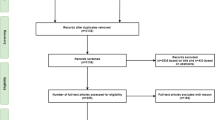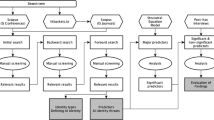Abstract
The paper tries to bridge gap between knowledge management and artificial intelligence approaches proposing agent-based framework for modelling organization and personal knowledge. The perspective of knowledge management is chosen to develop two conceptual models—one describes the intelligent enterprise memory, another models an intelligent organization’s knowledge management system. The concept of an agent-based environment of the knowledge worker for personal and organizational knowledge management support is introduced.
Similar content being viewed by others
References
Apshvalka, D., & Grundspenkis, J. (2003). Making organizations to act more intelligently in the framework of the organizational knowledge management system. Scientific proceedings of Riga Technical University, 5th series computer science, applied computer systems (Vol. 17, pp. 72–82). Riga: RTU Publishing.
Apshvalka D. (2004). Personal knowledge management. In: D. Remenyi (Ed.), Proceedings of the 11th European conference on information technology evaluation (ECITE), Amsterdam, Netherlands, November 11–12, 2004, pp. 17–22.
Apshvalka, D., & Grundspenkis, J. (2005). Personal knowledge management and intelligent agent perspective. In A. G. Nilsson, et al. (Eds.), Proceedings of the 14th international conference on information systems development Pre-Conference-ISD 2005. Karlstad, Sweden, 14–17 August, 2005, Karlstad University Studies, Karlstad, Sweden, pp. 219–230.
Brooking A. (1999). Corporate memory: Strategies for knowledge management. London, International Thomson Business Press
Ellis C., Wainer J. (2002). Groupware and computer supported cooperative work. In: Waiss G. (ed). Multiagent systems. A modern approach to distributed artificial intelligence. Massachusetts, MIT Press, pp. 425–458
Galliers R.D., Newell S. (2001). Back to the future: from knowledge management to data management. In Smithson S. et al. (eds) Proceedings of the 9th European Conference on Information Systems, University of Maribor, Slovenia, 2001, pp. 609–615
Grundspenkis J. (2001). Concepts of organizations, intelligent agents, knowledge, learning and memories: Towards an inter-disciplinary knowledge management. In: Wang K., Grundspenkis J., Yerofeyev A. (eds). Applied computational intelligence to engineering and business. Riga, RTU Publishing, pp. 172–191
Grundspenkis, J. (2003). Development of hybrid intelligent systems: integration of structural modelling, intelligent agents and knowledge management techniques. Scientific proceedings of Riga Technical University, 5th series computer Science, applied computer systems (Vol. 17, pp. 7–30). Riga: RTU Publishing.
Grundspenkis, J., & Kirikova, M. (2005). Impact of the intelligent agent paradigm on knowledge management. In: C. T. Leondes (Ed.), Intelligent knowledge-based systems, Vol. 1: Knowledge-based systems. Boston: Kluwer Academic Publishers.
Hummingbird, A. (2001). Enterprise Information portals. Enabling knowledge management in today’s knowledge economy. Whitepaper.
Kirikova M., Grundspenkis J. (2000). Using knowledge distribution in requirements engineering. In Leondes C.T. (ed). Knowledge based systems. Techniques and applications (Vol. 1, pp. 149–184). San Diego, USA: Academic Press.
KM Magazine. Personal knowledge management, Vol. 7, Issue 7, http://www.kmmagazine.com.
Knapik M., Johnson J. (1998). Developing intelligent agents for distributed systems. New York, McGraw Hill
Nonaka I., Takeuchi H. (1995). The knowledge creating company: How Japanese companies create the dynamics of innovation. New York, Oxford University Press
Sveiby, K.-E. (2000). What is knowledge management? http://www.sveiby.com.au/KnowledgeManagement.html.
Tsui, E. (2002). Technologies for personal and Peer-to-Peer (P2P) knowledge management, CSC Leading Edge Forum Technology Grant Report.
Walsh J.P., Ungson G.R. (1991). Organizational memory. Academy of Management Review 16(1): 57–91
Zhong N., Liu J., Yao Y.Y. (eds). (2003). Web intelligence. Berlin, Springer-Verlag
Woodridge M. (2002). An introduction to multiagent systems. Chichester, West Sussex, England, John Wiley & Sons
Author information
Authors and Affiliations
Corresponding author
Rights and permissions
About this article
Cite this article
Grundspenkis, J. Agent based approach for organization and personal knowledge modelling: knowledge management perspective. J Intell Manuf 18, 451–457 (2007). https://doi.org/10.1007/s10845-007-0052-6
Published:
Issue Date:
DOI: https://doi.org/10.1007/s10845-007-0052-6




